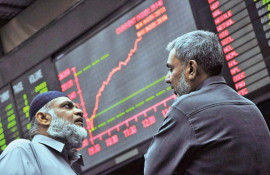
The management of IGI Insurance is well reputed and experienced, and that finesse is reflected in 10-year gross premium growth of 21% per annum and consistent underwriting profit since at least 1994.
But the ‘value’ I want to talk about is not in the insurance business, but on the investment side. General (property and casualty) insurers hardly make money on core operations due to competition, and the juice lies in investment performance.
Indeed, acquiring insurance companies has been a fashioned way for investors such as Warren Buffet and Prem Watsa of Fairfax Holdings to get zero-cost funding to invest. Premiums are received in advance, while claim payments are spread over a year or more. Thus, if underwriting business keeps growing, funds under management keep rising and the cost of funding is actually negative.
With IGI stock valued at Rs7 billion, the market value of investments (and equity) on the balance sheet is around Rs20 billion. 85% of this investment value comes from a 10% stake in Nestle Pakistan (valued on equity method and hence understated on balance sheet).
Nestle sales and operating profitability grew by an astounding 27% per annum over eight years. The trend continues in the latest quarter after a rare blip in 3Q11.
Therefore, keeping in mind competition from Engro Foods, let’s assume that Nestle will grow in the future at 15%, ie in line with nominal GDP and thus trade at half the current valuation of 40x earnings. IGI should still be worth Rs12 billion, presenting a 70% potential upside.
A couple of concerns need to be addressed. It seems that a 30-50% of IGI underwriting business comes from associated group companies such as Packages Limited (paper and packaging manufacturer). However, I value the IGI core operations at only around Rs1 billion, so this concentration risk can probably be glossed over.
Secondly, IGI owns 25% of Packages Limited which in turn owns 10% of IGI. For this, I agree that IGI should trade at a slight discount (say 10%) to book value, but certainly not at half the true book.
Finally, the management does not have an intention to realise gains on Nestle investment which puts the question of, exactly how and when, the shareholders benefit?
My answer is that IGI has no need to completely sell an investment like Nestle. It is hard to identify such companies and a significant stake should command a premium if a sale is necessary. Obviously at times of overvaluation as seems currently for Nestle, the management should trade somewhat and book some profits and invest in cheaper securities.
However, that would require active management which IGI may or may not want to focus on. Nonetheless, an easier and better way for management to garner value for the company and shareholders would be to ‘buy back’ its own shares from the market.
Secondly, in terms of realisation, IGI has more or less completely passed on dividends received from Nestle (and Packages, etc) over the years to its shareholders and has not replenished its coffers. Hence, IGI can virtually be treated as a special pass-through vehicle/closed-end fund to invest in Nestle Pakistan.
The writer works as an economist and portfolio manager
Published in The Express Tribune, September 17th, 2012.


1732243059-0/mac-miller-(2)1732243059-0-165x106.webp)

1672385156-0/Andrew-Tate-(1)1672385156-0-165x106.webp)












COMMENTS
Comments are moderated and generally will be posted if they are on-topic and not abusive.
For more information, please see our Comments FAQ